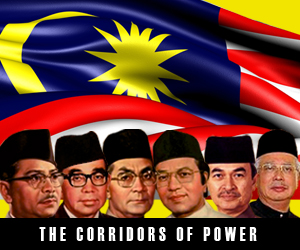Malays do not have special rights
This is the crux of the whole matter. The Malays and natives do not have special rights. However, under Article 153, they do have certain privileges. Hence to remove these privileges you must remove the Article that allows them these privileges.
THE CORRIDORS OF POWER
Raja Petra Kamaraudin
I find that many readers are still talking (commenting, arguing, debating, lamenting, etc.) about the special rights of the Malays. And this is in spite of me explaining so many times and for so long that there is no such thing as special rights.
In my article, Visiting the Malay ‘Rights’, I had commented on article 153 of the Federal Constitution. I stated that under its provisions, the Malays in fact do not possess any special ‘rights’.
There is only the special ‘position’ of the Malays and the natives of Sabah and Sarawak. In general, this special position does not confer any right which is recognised by law to the Malays.
Specifically, what is contained in article 153 is the power vested in His Majesty the Yang di Pertuan Agong to ensure that places in the civil service and institutions of higher learning are reserved for the Malays and the natives of Sabah and Sarawak as His Majesty deems reasonable.
Additionally, His Majesty is also given the power to reserve a quota for the Malays and the natives of Sabah and Sarawak in the allocation of scholarships, and permits or licences required for business and trade. This power is similarly to be exercised by His Majesty as His Majesty deems reasonable.
(Art Harun, Article 153 on the ‘special position’ of the Malays and other natives: The way forward)
Basically, Article 153 of the Federal Constitution of Malaysia puts the responsibility on the Yang di-Pertuan Agong to safeguard the special position of the Malays and natives of any of the States of Sabah and Sarawak and the legitimate interests of other communities and goes on to specify ways to do this, such as establishing quotas for entry into the civil service, public scholarships and public education.
So, in short, the Bumiputeras (Malays and natives) are allowed certain privileges. But privileges and rights are two different things. Rights cannot be removed. Privileges can. For example, you have the privilege of posting comments in Malaysia Today. I have a right to disallow your comment.
As I have been explaining for the last 35 years or so since the late 1970s, the New Economic Policy is (or was) not law. It is called ‘Hasrat Dasar Ekonomi Baru’, which translates to ‘the aspirations of the New Economic Policy’.
Note the keyword here: hasrat or aspiration.
You may aspire to be the richest person in Malaysia. But that does mean by law you must become the richest person in Malaysia. I am now 64 and I aspire to live to at least 80. That does not mean, by law, it must happen. I may well be dead before I am 70.
There was talk back in the 1970s that someone should go to court and challenge the New Economic Policy and try to get it declared unconstitutional. After all, the New Economic Policy is just an aspiration and not a policy passed by Parliament or an Act made into law by Parliament.
However, after looking into this matter, the lawyers decided it might be a futile exercise. Even though the New Economic Policy is not law and was never passed by Parliament or made into an Act, the Constitution is so loose that under Article 153 it gives the Agong almost unlimited powers to decide what can and cannot be done.
And that is why many are challenging Article 153 and are trying to get it repealed. If Article 153 can be removed then many of the powers of the Agong can be abolished. And that would mean the special position of the Malays and natives as well, which are protected by the Agong.
And that is also why Malays are very sensitive regarding those who are challenging Article 153 and are trying to get it repealed. As long as Article 153 is in the Constitution, almost anything can be done. Without Article 153, the Malays and natives would no longer be privileged and have a special position.
“Let us not forget that in Malaysia, the Federal Constitution is the highest law,” said DAP’s acting national chairman Tan Kok Wai today.
Yes, even DAP acknowledges that the Constitution is supreme. And Article 153 is in that Constitution. Hence, to remove the special position of the Malays and natives, meaning their privileges, you must first repeal Article 153.
Umno would not want to do that. MCA, MIC, Gerakan, PPP, etc., would probably also not dare suggest it, for obvious reasons. So now it is left to DAP, PKR and PAS, meaning Pakatan Rakyat. (PSM and PRM would most likely vote in favour of repealing Article 153).
So what is the position of DAP, PKR and PAS? Are they opposed to Article 153 and will they openly state that they want this repealed if they ever came to power and controlled two-thirds of Parliament (because you need two-thirds to amend the Constitution)?
It is important that Pakatan Rakyat make clear its stand on Article 153. It is no use screaming about discrimination, Apartheid, and so on, while at the same time remaining silent or uncommitted regarding the various Articles in the Constitution that allows certain things that you oppose.
This is the crux of the whole matter. The Malays and natives do not have special rights. However, under Article 153, they do have certain privileges. Hence to remove these privileges you must remove the Article that allows them these privileges.
Is Pakatan Rakyat prepared to do this and can this be part of their Election Manifesto for the coming general election in 2018 or thereabouts? If not, then whatever you say comes to nought in the end.


